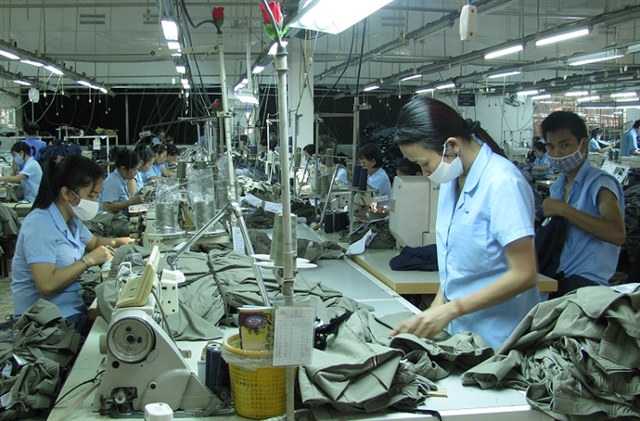 Society
Society


|
| Workers are badly impacted by the COVID-19 pandemic. — VNA/VNS Photo |
HÀ NỘI — The Ministry of Labour, War Invalids and Social Affairs (MOLISA) is collecting opinions from ministries and agencies to complete a draft resolution on policies to support labourers and businesses impacted by the COVID-19 pandemic.
This will be the second assistance package.
According to the General Statistics Office, the COVID-19 pandemic continues to have a strong impact on the labour market and in the first quarter of 2021, up to 9.1 million workers were affected. Of which, more than 500,000 workers lost their jobs and more than 2.8 million people had to take unpaid leave.
The fourth COVID-19 outbreak, which started at the end of April, has spread to industrial parks and export processing zones, where hundreds of thousands of people work.
Industries including passenger transport, aviation, tourism, hotel and entertainment services have been strongly affected.
There are a number of policies being considered for the package, including exemption of employees’ payment to the insurance fund for occupational accidents and diseases for 12 months but with labour benefits still guaranteed, the suspension of businesses’ payment to the retirement and death funds for six months, use of the unemployment insurance fund to help enterprises retrain workers, and direct monetary support for workers who have terminated their contracts, taken leave without pay or lost their jobs but are not yet eligible for unemployment benefits.
Slow disbursement of first package
In April last year, with MOLISA’s consultation, the Government approved the first support package worth VNĐ62 trillion (more than US$2.7 billion).
Of the total, VNĐ35.88 trillion ($1.6 billion) was used to assist policy beneficiaries, the poor, freelance workers, those who lost their jobs and household businesses, while about VNĐ16.2 trillion was for businesses as preferential loans to pay salaries for employees.
The Government also allowed businesses to temporarily stop paying to the retirement and death funds with the total value of VNĐ6.5 trillion ($280.7 million) and extracted from unemployment insurance fund VNĐ3 trillion ($130 million) for businesses to retrain employees.
According to MOLISA, by May this year, the first supporting package had disbursed just VNĐ13.1 trillion ($565.8 million), equivalent to more than 22 per cent.
The State Treasury of Việt Nam reported that the disbursement for 12 million policy beneficiaries and the poor was more than VNĐ11.7 trillion ($505 million).
The group of workers with labour contracts of 229,499 people were assisted with more than VNĐ258.1 billion ($12.3 million), 1 million workers without labour contracts who lost their jobs received VNĐ1 trillion ($43 million) and 37,313 household businesses were given VNĐ38 billion ($1.64 million).
Thus, last year’s package disbursed cash to 13,190,989 beneficiaries.
According to an assessment from labour experts, groups of policy beneficiaries and poor households were paid quickly and on time due to the available lists and standard data systems.
As for the remaining target groups, especially workers without labour contracts and household businesses, the support was slow due to many administrative procedures and regulations on conditions and standards to receive the assistance.
Worse yet, the remaining supporting targets were not achieved as planned.
Only VNĐ41 billion ($1.78 million) of the VNĐ16.2 trillion ($701 million) as loans for salary payment was disbursed, while none of the package worth VNĐ3 trillion ($130 million) from the unemployment insurance fund could be disbursed.
Regarding the slow disbursement, the MOLISA said at the time of the policy proposal, the COVID-19 pandemic was complex and the number of beneficiaries was so large that the basis for identifying those eligible faced many difficulties and implementation duration was expected to last long.
In addition, in some localities, some households were listed for support without meeting criteria, while the conditions for businesses to borrow loans to pay salaries were difficult to fulfil and the loan amounts were low, so many businesses struggle to access support.
The disbursement of the first package showed there were many procedures and obstacles for authorities to remove when implementing more support policies.
According to Dr Nguyễn Thị Lan Hương, former director of the Institute of Labour and Social Sciences, the second support package for workers and businesses is aimed towards a specific group of people affected by the pandemic and it must be clear and simple in terms of procedures and paperwork. — VNS